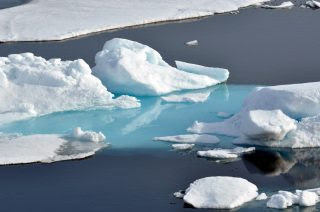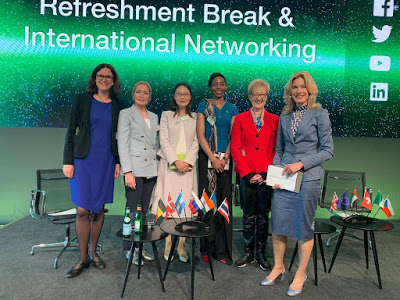The Clean Arctic Alliance (CAA) has called on IMO member
states to reduce the impact of black carbon emissions from international
shipping on the Arctic environment.
states to reduce the impact of black carbon emissions from international
shipping on the Arctic environment.
The
non-governmental organization pointed to the issue as the IMO gathers in
London for a meeting of its Marine Environmental Protection Committee (MEPC74).
non-governmental organization pointed to the issue as the IMO gathers in
London for a meeting of its Marine Environmental Protection Committee (MEPC74).
A number
of issues, including black carbon emissions and heavy fuel oil (HFO) in the
Arctic will feature on the MEPC74 agenda from May 13-17.
of issues, including black carbon emissions and heavy fuel oil (HFO) in the
Arctic will feature on the MEPC74 agenda from May 13-17.
The
Clean Arctic Alliance says emissions of black carbon particles by ships burning
heavy fuel oil have a dramatic climate warming effect – black carbon is a
potent short-lived climate forcer that remains in the atmosphere for only a few
days to weeks.
Clean Arctic Alliance says emissions of black carbon particles by ships burning
heavy fuel oil have a dramatic climate warming effect – black carbon is a
potent short-lived climate forcer that remains in the atmosphere for only a few
days to weeks.
But when black carbon is emitted from ships burning heavy fuel
in or near Arctic waters, particles fall on ice or snow, reducing its albedo
(reflectivity) and causing it to absorb more heat, thus accelerating the
warming of the Arctic region. As well as the second leading cause of global
warming, black carbon emissions are also harmful to human health.
in or near Arctic waters, particles fall on ice or snow, reducing its albedo
(reflectivity) and causing it to absorb more heat, thus accelerating the
warming of the Arctic region. As well as the second leading cause of global
warming, black carbon emissions are also harmful to human health.
“By cutting ship-sourced emissions of black
carbon, IMO member states could take a quick and effective path to countering
the current climate crisis, and minimize further impacts on the Arctic,”said Sian Prior,
Lead Advisor to the Clean Arctic Alliance.
carbon, IMO member states could take a quick and effective path to countering
the current climate crisis, and minimize further impacts on the Arctic,”said Sian Prior,
Lead Advisor to the Clean Arctic Alliance.
“We’re calling on IMO member states to
champion a move away from using heavy fuel oils – shipping’s number one source
of black carbon – in Arctic waters. With cleaner shipping fuels already
available and innovation and ambition driving the global shipping industry
towards lower emissions, IMO member states must move rapidly towards zero
emission solutions.
champion a move away from using heavy fuel oils – shipping’s number one source
of black carbon – in Arctic waters. With cleaner shipping fuels already
available and innovation and ambition driving the global shipping industry
towards lower emissions, IMO member states must move rapidly towards zero
emission solutions.
“All eight Arctic countries made a
commitment to demonstrate leadership on black carbon in 2015 – and it now seems
that all except Canada are backing a move away from heavy fuel oil in the
Arctic. As recent comments from Russia’s President Putin and Finland’s
President Niinistö demonstrate, the political will for a HFO Free Arctic exists
– now it is the time for IMO Member States to turn this will into action, by
moving urgently to reduce black carbon emissions and by backing the ban on the
use and carriage of HFO in the Arctic, currently under development.”
commitment to demonstrate leadership on black carbon in 2015 – and it now seems
that all except Canada are backing a move away from heavy fuel oil in the
Arctic. As recent comments from Russia’s President Putin and Finland’s
President Niinistö demonstrate, the political will for a HFO Free Arctic exists
– now it is the time for IMO Member States to turn this will into action, by
moving urgently to reduce black carbon emissions and by backing the ban on the
use and carriage of HFO in the Arctic, currently under development.”
At MEPC
72 in April 2018, a strongly-worded proposal to ban HFO as shipping fuel from
Arctic waters was co-sponsored by Finland, Germany, Iceland, Netherlands, New
Zealand, Norway, Sweden and the US. The ban is currently being developed within
the IMO.
72 in April 2018, a strongly-worded proposal to ban HFO as shipping fuel from
Arctic waters was co-sponsored by Finland, Germany, Iceland, Netherlands, New
Zealand, Norway, Sweden and the US. The ban is currently being developed within
the IMO.
CAA also
reiterated a warning by UN’s Intergovernmental Panel on Climate Change, which
warned that we have 12 years to limit a climate change catastrophe. Recent
reports suggest that Greenland’s ice sheet is endangered, with about half of
the nearly 5,000 gigatons of water lost from the ice sheet since 1927 occurring
in 8 years between 2010 and 2018.
reiterated a warning by UN’s Intergovernmental Panel on Climate Change, which
warned that we have 12 years to limit a climate change catastrophe. Recent
reports suggest that Greenland’s ice sheet is endangered, with about half of
the nearly 5,000 gigatons of water lost from the ice sheet since 1927 occurring
in 8 years between 2010 and 2018.
(World Maritime News)


































































